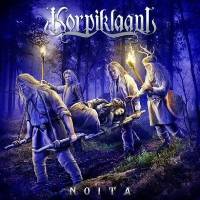With fast tempos, cheerful melodies, and songs about drinking, folk metal can be quite a fun journey, but if bands aren’t careful and don’t keep the creative juices flowing, the sound can become repetitive and lose what makes it special. Having led the genre for the better part of a decade, Finnish folk metal maestros Korpiklaani have churned out a number of albums, some better than others. When Korpiklaani (meaning forest clan or clan of the wilderness) first hit the scene, they were on fire, utilizing traditional folk instruments such as violin and accordion to mix playful, upbeat melodies with heavy, driving guitar riffs. The formula hasn’t changed much over the years; however the band takes a step forward with their latest effort, Noita, which translates as “witch” or “witch doctor.”
Noita is Korpiklaani’s ninth studio album and what sets it apart from recent predecessors is the decision to go in more of a folk direction, giving the spotlight to violinist Tuomas Rounakari and accordionist Sami Pertulla, who are responsible for the majority of solos on the album and often take the lead, letting the guitars and bass sit back and anchor the songs with solid rhythms and driving riffs. A great example of this can be found on the energetic “Pilli On Pajusta Tehty,” which features “oi, oi, oi” chants and sees Rounakari and Pertulla taking the creative lead while meaty mid-paced riffs are laid down by bassist Jarkko Aaltonen and guitarists Kalle “Cane” Savijärvi and Jonne Järvelä, who also handles lead vocals, hurdy gurdy and some percussion on the album. The fact that both Rounakari and Pertulla are recent additions to the fold, Rounakari on board for the band’s last effort, Manala, and Pertulla joining later, may have helped breathe new life into the band and allowed it to freshen up its sound. Allowing the violin and accordion to soak up the spotlight lends a feel good, party vibe to the album akin to Alestorm, which is especially evident on “Luontoni.” A fast-paced affair from start to finish, the song features an up-tempo, catchy melody, employing heavy guitars and sharp accordion and violin bursts
The band slows things down on the darker-tinged “Minä Näin Vedessä Neidon,” which possesses an ominous dirge-like quality and features acoustic guitar and longer instrumental passages, as well as first single “Lempo.” Drummer Matti “Matson” Johansson does a great job here injecting exciting fills while anchoring the song with a slow but steady beat, especially in the verses, allowing Jarkko, Cane, and Jonne to provide more of a trot than a gallop pace, with Rounakari and Pertulla again providing colorful flourishes and solos. The tempo almost feels stretched out in the chorus, giving off a swaying back and forth feeling. Like fellow countrymen Ensiferum, Korpiklaani has decided to include a cover, choosing to put their Finnish folk spin on Tommy James & The Shondells’ “Mony Mony,” later made famous by Billy Idol. Choosing to sing the song in Finnish, here called “Jouni Jouni,” the catchy violin melody and folk chanting allow the band to put their own stamp on a choice out of left field, but one that works very well.
The album starts and ends on a strong note, opening with “Viinamäen Mies,” a signature catchy, energetic opener in line with “Let’s Drink” or “Vodka,” and closing with “Sen Verran Minäkin Noita,” another darker number that kicks off with some rapid drumming and sees Cane and Jonne in the forefront with some heavy thrash riffing. The song possesses a Grand Magus meets Moonsorrow vibe and features back to back solos from Rounakari and Pertulla before the two join together one final time. Jonne’s rugged, gruff vocal delivery bears a striking resemblance to Das Letzte Einhorn of German medieval metallers In Extremo and works especially well here.
Korpiklaani has been leading the folk metal charge for a while now, and if you’re not a fan of the band’s up-tempo, energetic songs celebrating nature, often over hearty food and drink, then Noita won’t do anything to change your mind. But for those of us who don’t mind tapping our feet and raising our mugs (or mead horns), Noita is a worthy addition to the collection.


